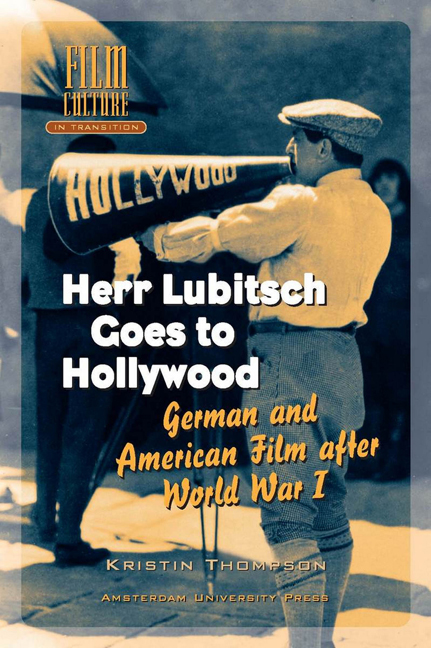Book contents
- Frontmatter
- Dedication
- Contents
- Acknowledgements
- Introduction
- Chapter One Lubitsch’s Career
- Chapter Two Making the Light Come from the Story: Lighting
- Chapter Three Subduing the Cluttered Background: Set Design
- Chapter Four Guiding the Viewer’s Attention: Editing
- Chapter Five Peeking at the Players: Acting
- Chapter Six Mutual Influences
- Epilogue: The Lubitsch Touch
- Notes
- Filmography
- Index
- Film Culture in Transition
- Plate Section
Epilogue: The Lubitsch Touch
Published online by Cambridge University Press: 14 January 2021
- Frontmatter
- Dedication
- Contents
- Acknowledgements
- Introduction
- Chapter One Lubitsch’s Career
- Chapter Two Making the Light Come from the Story: Lighting
- Chapter Three Subduing the Cluttered Background: Set Design
- Chapter Four Guiding the Viewer’s Attention: Editing
- Chapter Five Peeking at the Players: Acting
- Chapter Six Mutual Influences
- Epilogue: The Lubitsch Touch
- Notes
- Filmography
- Index
- Film Culture in Transition
- Plate Section
Summary
Almost anyone writing about Lubitsch, from a journalistic or academic perspective, invokes “The Lubitsch Touch” as shorthand for some elusive quality that sets this director's work apart. The phrase is vague and usually not very helpful. Anyone who knows what it means already knows Lubitsch, and for someone who does not know Lubitsch, the phrase explains little. It is not likely, however, to go away, and for that reason it might be helpful to end by trying to pin it down just a little, both in terms of its meaning and its origins.
There is a popular impression that the Lubitsch Touch usually indicates a moment of sophisticated sexual innuendo, but in fact commentators tend to imply something more general. Even though Lubitsch is today far less known to the public than Hitchcock, Ford, or Hawks, filmmakers tend to retain an enormous amount of respect and affection for him. Peter Bogdanovich made this stab at defining the Touch:
“The Lubitsch Touch” – it was as famous a moniker in its day as Hitchock's “Master of Suspense,” though perhaps not as superficial. The phrase does connote something light, strangely indefinable, yet nonetheless tangible, and seeing Lubitsch's films – more than in almost any other director's work – one can feel this certain spirit; not only in the tactful and impeccably appropriate placement of the camera, the subtle economy of his plotting, the oblique dialog which had a way of saying everything through indirection, but also – and particularly – in the performance of every single player, no matter how small the role.
Billy Wilder was a bit more specific:
It was the elegant use of the Superjoke. You had a joke, and you felt satisfied, and then there was one more big joke on top of it. The joke you didn't expect. That was the Lubitsch touch …
Find some new way to tell your story. That was the magic of Lubitsch. He is eternally essential to me.
- Type
- Chapter
- Information
- Herr Lubitsch Goes to HollywoodGerman and American Film after World War I, pp. 127 - 132Publisher: Amsterdam University PressPrint publication year: 2005



